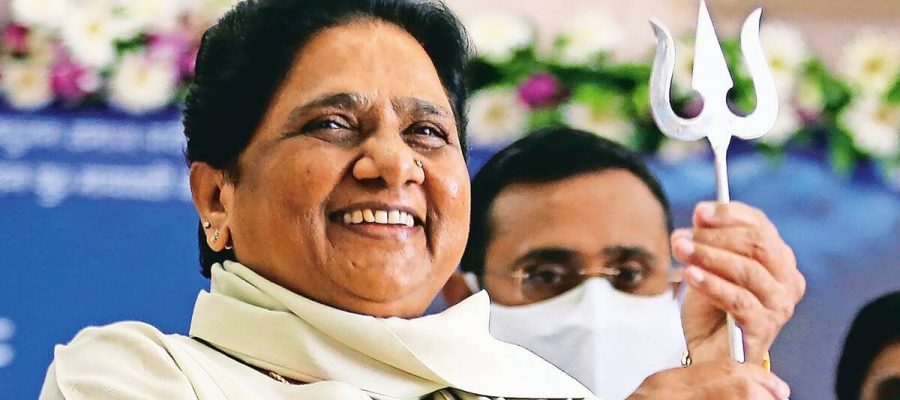Unlike BSP conventions of the past, a sizeable number of people in saffron robes were present at the meeting. Mayawati was presented a trishul and a small statue of Lord Ganesha.
Amidst blowing of conch shells and slogans of Jai Shri Ram, Jai Siya Ram and Har Har Mahadev, the BSP Tuesday concluded the first phase of its meetings targeted at the Brahmin vote ahead of the Uttar Pradesh Assembly elections.
Addressing a ‘Vichar Sangoshthi (symposium)’ at the BSP headquarters here to mark the conclusion of its month-long ‘Prabuddha Varga Sammelans’, party chief Mayawati made a series of promises to the Brahmin community and called upon it to join hands with Dalits and rally behind the BSP. The Sammelans were kicked off by the BSP from Ayodhya on July 23.
Unlike BSP conventions of the past, a sizeable number of people in saffron robes were present at the meeting. Mayawati was presented a trishul and a small statue of Lord Ganesha.
The BSP had formed a government on its own in 2007, winning 206 seats in the 403-member UP Assembly, largely on account of her successful social engineering, forging Dalit-Brahmin unity. However, the Brahmins had deserted the BSP soon after, with the party finishing third in the 2009 Lok Sabha polls.
“If the Brahmin community emulates Dalits and doesn’t fall for any allurement, then no force can stop us from forming a majority government, just like in 2007,” Mayawati said Tuesday, adding that the BSP believes in ‘Sarvjan Hitay, Sarvjan Sukhay (everyone’s well-being, everyone’s happiness)’.
Mayawati described Dalits as “mazboot chattan (solid rock)” who always stood by their party and hoped other communities supporting the BJP would also do the same.
She also accused Samajwadi Party (SP) and BJP governments in the state of having a “casteist, narrow and capitalist” mentality, leading to oppression of the poor, labourers, farmers, small businessmen, Dalits, Backwards and the Brahmins — or the prabuddha (enlightened), as all parties are calling the Brahmins in the race for the community’s vote.
Estimated to number around 11% of the total voters in UP, the Brahmins are seen as estranged from the BJP under the Yogi Adityanath government. Adityanath is a Thakur, the other influential upper caste community in the state.
On Sunday, the BJP kicked off a series of meetings for the “enlightened class”, which will last a fortnight and cover all the 403 constituencies of the state. The SP is holding similar meetings, and on Monday even held a ‘Shiv Sevak Sammelan’ aimed at a sub-section among the Brahmins — the influential Goswamis. The Congress has been claiming that it has given UP the maximum number of Brahmin CMs.
“People of the Brahmin community are now openly saying the BSP reign was much better, in every way. They are saying they fell for the BJP’s gimmicks and regret giving it a full-majority government,” Mayawati said Tuesday, adding that the government led by her had taken several “historical steps” for the safety, dignity and development of Brahmins.
Accusing the BJP of putting up hurdles in the BSP’s Prabuddha Varga Sammelans, Mayawati promised that if voted to power, the BSP would conduct an inquiry into heavy-handed measures under the BJP government.
She asked BSP leaders to induct and ready at least 1,000 Brahmin workers per Vidhan Sabha seat as part of the second phase of poll preparations, apart from drawing OBC, Muslim and Kshatriya workers.
Questioning RSS chief Mohan Bhagwat’s statement that Hindus and Muslims share the same ancestry and that every Indian is a Hindu, Mayawati asked why the Sangh and BJP treated members of the minority community as adopted then.
Mayawati repeatedly thanked the office-bearers and workers of her party, mainly the Brahmins, including general secretary Satish Chandra Mishra, for fighting the BJP.
The BSP president also promised that she won’t make any new park or memorial in Uttar Pradesh if voted to power, focusing instead on development and Brahmin security. “We do not need to make any new monument or park in the name of those who were our guiding light. We have already done that during our previous terms,” she said, adding that she was open to erecting such memorials for leaders of “other communities”.
Source: Read Full Article


